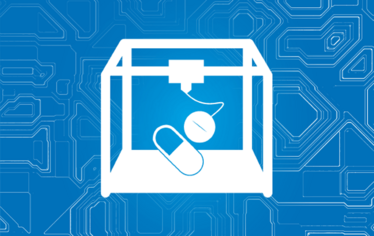A New Dimension to Medicine Manufacture
Fabricating medicine using a printer may sound like the stuff of science fiction, but the technology exists – and the pharma industry has finally taken the plunge. The FDA approved the first 3D-printed drug in August, and with researchers working on printing everything from tablets to organs, the big question is, will more approvals follow?

Watching a 3D printer in action is like magic; it seems as if a solid object is being made from thin air. But if you’re into technology, you’ll know that 3D printers typically construct objects by layering material from a filament inside the printer. So not quite magic, but impressive nonetheless – it’s hardly surprising that it has captured the attention and imagination of people everywhere, from engineers, to researchers, to everyday consumers. Companies are using 3D printing for many applications including printing parts in the automotive and aerospace industries, producing toys, creating food and even printing shoes. The technology can print complex geometries and shapes that might not be possible using traditional manufacturing methods, as well as one-off custom parts, which has made it popular in prototyping.
3D printing has also seen great uptake in healthcare, particularly in medical implants and devices. It has been used to make low-cost medical devices, such as a stethoscope for use in the Gaza Strip (1), prosthetic hands and other artificial limbs, as well as hearing aids, dental implants, bone implants and more (2). So what about the notoriously conservative world of pharmaceutical manufacturing? At the start of August, pharma and 3D printing made media headlines when Aprecia Pharmaceuticals announced that the FDA had approved SPRITAM, an epilepsy drug for treating seizures (3). The drug is made with the company’s ZipDose Technology, which uses 3D printing to make formulations more porous. Thanks to the precision enabled by 3D printing, ZipDose allows a very high drug load (up to 1,000 mg) to be given in a single dose. Just one sip of liquid and it disintegrates in less than 10 seconds.
Aprecia is currently the only company that has received an FDA approval for a new drug manufactured, in part, using 3D printing. Compared to other industries, which are routinely hitting headlines with 3D printing-related announcements, pharma’s success may seem limited. And on the face of it, 3D printing and pharma does not seem like the perfect match. After all, most applications of 3D printing use plastic and metal as base materials – useful in pharmaceutical tooling and machinery perhaps – but what about the highly-specialized compounds and materials used in medicine manufacture? It’s a challenge that the pharma research community has risen to meet, by adapting 3D printing to more specific needs. In the following series of articles, we take a look at the hot research projects that are shaping pharma’s 3D future.
- Wired, “Meet the Doctor Bringing Cheap, 3D Printed Medical Devices to Gaza,” (August, 2015). www.wired.co.uk
- Econolyst, “3D Printing & Additive Manufacturing in the Medical and Healthcare Marketplace,” (2013). www.econolyst.co.uk
- Aprecia Pharmaceuticals, “FDA Approves the First 3D Printed Drug Product,” (August, 2015). www.aprecia.com

Making great scientific magazines isn’t just about delivering knowledge and high quality content; it’s also about packaging these in the right words to ensure that someone is truly inspired by a topic. My passion is ensuring that our authors’ expertise is presented as a seamless and enjoyable reading experience, whether in print, in digital or on social media. I’ve spent fourteen years writing and editing features for scientific and manufacturing publications, and in making this content engaging and accessible without sacrificing its scientific integrity. There is nothing better than a magazine with great content that feels great to read.



















